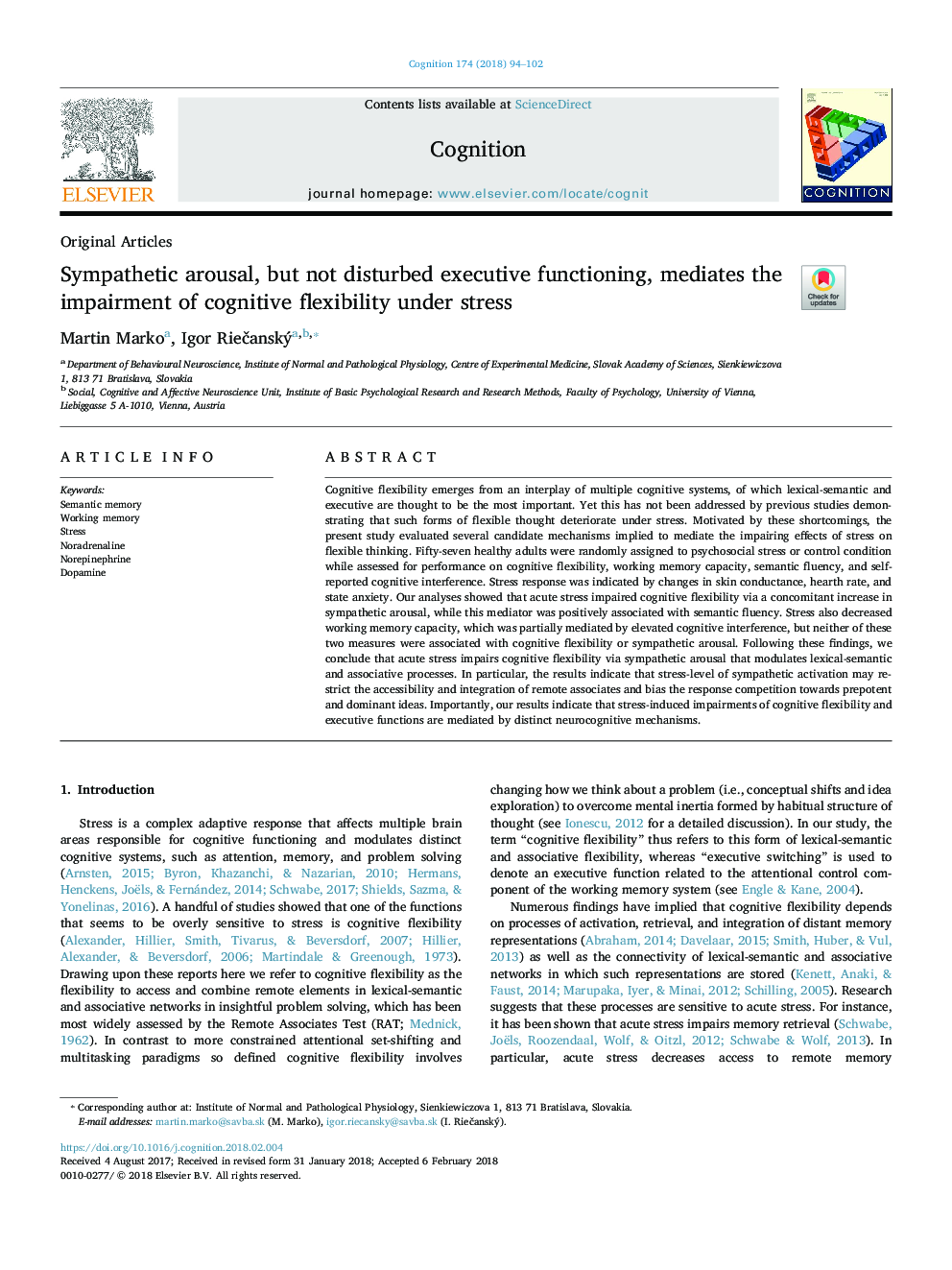| کد مقاله | کد نشریه | سال انتشار | مقاله انگلیسی | نسخه تمام متن |
|---|---|---|---|---|
| 7285418 | 1474093 | 2018 | 9 صفحه PDF | دانلود رایگان |
عنوان انگلیسی مقاله ISI
Sympathetic arousal, but not disturbed executive functioning, mediates the impairment of cognitive flexibility under stress
ترجمه فارسی عنوان
تحریک سمپاتیک، اما عملکرد اجرایی را مختل نمی کند، اختلال در انعطاف پذیری شناختی را تحت فشار قرار می دهد
دانلود مقاله + سفارش ترجمه
دانلود مقاله ISI انگلیسی
رایگان برای ایرانیان
کلمات کلیدی
حافظه معنایی، حافظه کاری، فشار، نورآدرنالین، نوراپی نفرین، دوپامین،
ترجمه چکیده
انعطاف پذیری شناختی ناشی از درهم آمیختن سیستم های مختلف شناختی است که مهم ترین آنها عبارت از واژگان-معنایی و اجرایی است. با این حال، مطالعات قبلی نشان داده است که چنین شکل هایی از تفکر انعطاف پذیر تحت فشار قرار دارد. در این تحقیق، با انگیزه های این کاستی ها، چندین مکانیسم نامزدی مورد بررسی قرار گرفت که به منظور کاهش تأثیرات ناشی از استرس بر تفکر انعطاف پذیری صورت می گیرد. بزرگسالان بالغ به طور تصادفی به استرس روحی و اجتماعی و یا شرایط کنترل در حالی که برای عملکرد در انعطاف پذیری شناختی، ظرفیت حافظه کار، استعداد معنایی و تداخل شناختی خود گزارش شده است. پاسخ استرس با تغییرات در میزان هدایت پوست، میزان هوشی و اضطراب حالت نشان داده شده است. تجزیه و تحلیل های ما نشان داد که استرس حاد، انعطاف پذیری شناختی را از طریق افزایش همراهی با تحریک سمپاتیک، در حالی که این میانجی به طور مثبت با فلسفه معنایی مرتبط است. استرس همچنین توانایی حافظه کاری را کاهش داد، که تا حدی با افزایش تداخل شناختی مواجه بود، اما هیچ یک از این دو معیار با انعطاف پذیری شناختی یا تحریک سمپاتیک همراه نبود. به دنبال این یافته ها، نتیجه گیری می کنیم که استرس حاد، انعطاف پذیری شناختی را از طریق تحریک سمپاتیک که فرایندهای لغوی-معنایی و وابسته را مدون می کند، تحت تاثیر قرار می دهد. به طور خاص، نتایج نشان می دهد که سطح استرس از فعال سازی سمپاتیک می تواند دسترسی و ادغام همکاران دور افتاده را محدود کند و رقابت پاسخ را نسبت به ایده های پر قدرت و غالب تعریف کند. مهم است که نتایج ما نشان می دهد که اختلالات ناشی از استرس ناشی از انعطاف پذیری شناختی و عملکرد اجرایی به وسیله مکانیسم های شناختی متمایز می باشد.
موضوعات مرتبط
علوم زیستی و بیوفناوری
علم عصب شناسی
علوم اعصاب شناختی
چکیده انگلیسی
Cognitive flexibility emerges from an interplay of multiple cognitive systems, of which lexical-semantic and executive are thought to be the most important. Yet this has not been addressed by previous studies demonstrating that such forms of flexible thought deteriorate under stress. Motivated by these shortcomings, the present study evaluated several candidate mechanisms implied to mediate the impairing effects of stress on flexible thinking. Fifty-seven healthy adults were randomly assigned to psychosocial stress or control condition while assessed for performance on cognitive flexibility, working memory capacity, semantic fluency, and self-reported cognitive interference. Stress response was indicated by changes in skin conductance, hearth rate, and state anxiety. Our analyses showed that acute stress impaired cognitive flexibility via a concomitant increase in sympathetic arousal, while this mediator was positively associated with semantic fluency. Stress also decreased working memory capacity, which was partially mediated by elevated cognitive interference, but neither of these two measures were associated with cognitive flexibility or sympathetic arousal. Following these findings, we conclude that acute stress impairs cognitive flexibility via sympathetic arousal that modulates lexical-semantic and associative processes. In particular, the results indicate that stress-level of sympathetic activation may restrict the accessibility and integration of remote associates and bias the response competition towards prepotent and dominant ideas. Importantly, our results indicate that stress-induced impairments of cognitive flexibility and executive functions are mediated by distinct neurocognitive mechanisms.
ناشر
Database: Elsevier - ScienceDirect (ساینس دایرکت)
Journal: Cognition - Volume 174, May 2018, Pages 94-102
Journal: Cognition - Volume 174, May 2018, Pages 94-102
نویسندگان
Martin Marko, Igor RieÄanský,
